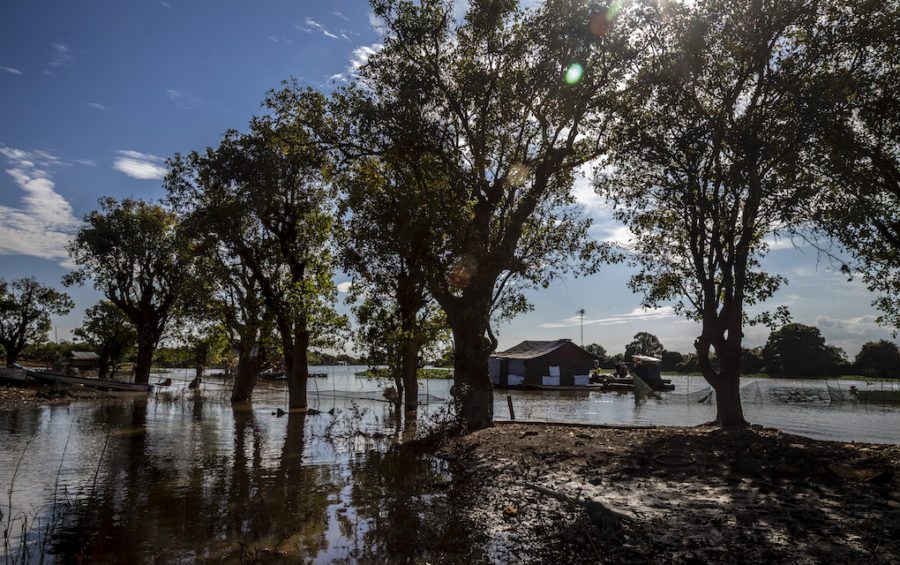About 20 days ago, Chum Phun, 54, led his family of six away from the Raingtoel floating village in Pursat province. His debt was too heavy, and there were no fish.
Phun said he had lived his life in the floating village, in Kandieng district’s Raingtoel commune, fishing like everyone else, but this year he joined hundreds of the village’s families escaping barren conditions on the Tonle Sap to survive elsewhere.
Two buses from a banana plantation in Kratie province arrived at the village last month to take them away. It was the third time in three months that the plantation had sent buses, Phun said.
He had debt to a microfinance company, the Tonle Sap was at record low levels, and he was competing against big boats with modern equipment.
“They have big tools. They take everything,” Phun said. “We just use hand-thrown nets and fishing rods. We couldn’t get enough to eat.”
Soy Keo, deputy chief of the local fishers association, said there was a severe shortage of fish, and most families had moved out.
Of the community’s 327 families, fewer than 60 remained, Keo said. Most went to the Kratie banana plantation, while others looked for factory work in Phnom Penh.
This year, there were days when fishers spent all day fishing and caught nothing, he said.
More than 90 percent of the families were in debt of at least $750, mostly to AMK Microfinance Institution, to buy fishing nets, bait and other supplies, Keo said.
“There’s no need to talk about the debt issue. Some want to hang themselves. Some couldn’t pay the debt, so they divorced their husband or wife and migrated,” Keo said.
“People’s lives here depend entirely on the Tonle Sap river. They own no farm. No land for burying their bodies. We worry so much. But even as we worry, we try to work to feed our stomachs, going wherever to serve others.”
Kandieng district governor Chhay Kim Mong said he didn’t have exact figures, but knew people were moving out in droves.
“Because this year the water is low, so the catch is less,” Kim Mong. “When it comes to fishing, there is a real deficit.”
Knhean Knhan, 42, is still at Raingtoel. If things continue the way they’ve been, he will also have to move with his wife and two children.
“The fish is almost gone,” Knhan said. “Living on the Tonle Sap, if we can’t catch fish, we’re finished. Our families will have nothing to eat. The only choice is going onto land to find a job.”
This year, Mekong and Tonle Sap water levels hit record lows and the fish catch has plummeted. Researchers point to upstream dams along the Mekong — mostly in China and Laos — as diverting water from reaching Cambodia, while the government says climate change and illegal fishing are the primary culprits.
Meanwhile, banana exports are on the rise in Cambodia, seeing a 15 percent year-on-year increase in the first six months of the year, though some plantation workers in Stung Treng have told of recurrent health woes, suspecting that agricultural chemicals are making them sick.
At the Kratie banana plantation, Phun, his wife and oldest son pick bananas and clip leaves for $210 each a month. The company provides accommodations, water and electricity.
He is among about 100 families from his floating village living together on the plantation, Phun said.
The families might consider going home eventually, but for now it was not really an option, he said.
“I am not sure yet. We will wait to see if the fish stocks in Tonle Sap near our village return,” Phun said.
Sour Vannak, 45, moved with his wife and two children around the same time as Phun. He had been at the floating village since 1979, and hopes that someday he can return.
But “fish species have been on the decline from year to year … and this year it’s really gone down. Almost every kind of fish is gone,” Vannak said.
“We also worry because we were born on the river, rarely moved onto land, and we have no land or farms like other villagers,” he said. “We don’t know what career we could have. … We fishers are less educated, and have fewer skills for working on land.”
Note: This report was produced with support from the Rosa Luxemburg Foundation under the financial support of the German Federal Ministry for Economic Cooperation and Development.














